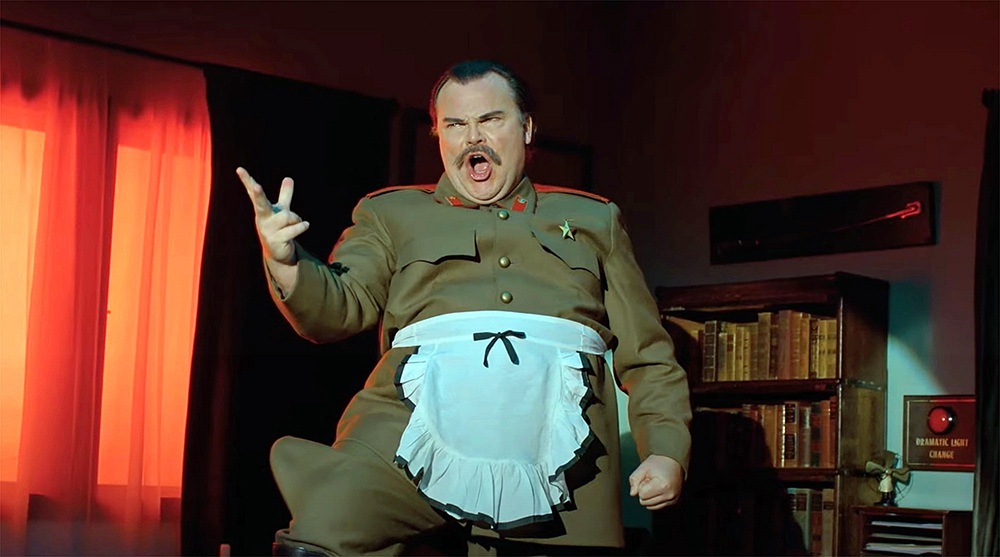People. People who need people…”
Oh my god, somebody make it stop! I could go the rest of my life without hearing that awful, awful song. But I know there’s no escaping it, and that’s what makes me especially thankful for the play Buyer & Cellar. Jonathan Tolins’ wise, Barbra Streisand-inspired comedy shines fresh light on old claptrap, making otherwise intolerable things more riveting than they deserve to be. Over the course of 90 preposterous minutes, Tolins made me care more about his fictional version of Streisand than I’ve ever been able to care about the real thing. The script presents as kitschy fluff, but the whole is considerably (somewhat mysteriously) more satisfying than the sum of its many hilarious bits.
Acknowledging Streisand’s litigious nature, Tolins opens Buyer & Cellar with a lengthy disclaimer. Nothing that happens in the play is real. Well, almost nothing. Babs is obviously real. She really owns a home in Malibu. In 2010, she actually published a coffee table book titled My Passion for Design, and the storage basement underneath her barn really is laid out like a shopping mall. The play transforms into fiction when it imagines what it might be like to work as the lone shopkeeper in Streisand’s artificial underground world, engaging with the lady of the house in some good, old-fashioned master-servant role-playing.
With his gleefully understated performance, Jordan Nichols single-handedly counterbalances all the enormous Broadway musicals running on other area stages. He introduces himself directly to the audience as Alex, an underemployed actor who’s agreed to become the human doll in Streisand’s private collection. He also plays Streisand and Barry, Alex’s boyfriend who can’t wrap his mind around the idea that a “privileged, powerful woman” like the Babs “still acts like a Dickensian victim.”
Nichols also walks the not-so-thin line separating diva and Devo by playing some of Buyer & Cellar‘s more prominent inanimate objects as well. Between scenes, he provides the mind-numbing, soul-crushing hum of vending machines. Pitch perfect.
Buyer & Cellar is at Circuit Playhouse through September 6th.
Three cheers for Theatre Memphis’ first-rate production of Mel Brooks’ enormously successful musical adaptation of his 1967 film, The Producers. It’s epically extravagant. It’s appropriately ridiculous. Director Cecelia Wingate and her extraordinary cast of low-brow comedians may have even out-Mel Brooksed the actual Mel Brooks. Having said all of that, I’m going to complain a little.
Wingate sees details other directors miss, but she tends to underscore all of them, overstuffing her plays with so many juicy bits and clever gags, it’s sometimes hard to distinguish between the stuffing and the meat. The Producers‘ success is rooted in its excess, making the overall experience more about brute force than outrageous farce. And, to be fair, it’s a pretty spectacular display of force.
Philip Andrew Himebook and Lee Hudson Gilliland are perfectly suited for their roles as Max Bialystock and Leo Bloom, the colorfully corrupt Broadway producers who are literally and figuratively screwing all the little old ladies in town. The former is a larger-than-life blowhard and bully. The latter a nebbish who has panic attacks when separated from his little blue blanket. They’ve formed an unlikely partnership to produce Springtime for Hitler, a play so offensive and awful it’s received as a work of satirical genius. That’s bad news for B&B, since the entire con was predicated on the show’s failure.
The Producers is a designer’s show, with hundreds of costume changes and a unique set of technical challenges. Theatre Memphis’ creative team has risen to the occasion and deserves top bows. From its illuminated swastikas to its spinning illuminated swastikas, The Producers‘ “Springtime for Hitler” sequence is an all-you-can-eat Bavarian buffet of bold choices and bad taste.
When Playhouse on the Square staged the regional premiere of The Producers in 2008, I groused that it was too understated. This time out, Theatre Memphis has erred, boldly, and often brilliantly, in the other direction. In a play where showgirls wear gigantic pretzels and sausages on their heads, that’s absolutely the side to err on.


